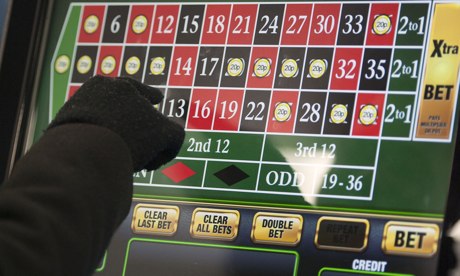
Wages will be linked to the profits of high-speed, high-stakes betting terminals. Photograph: Daniel Hambury/PA
Hundreds of staff at Britain’s biggest independent bookmaker have been told weeks before Christmas that their pay is being cut by hundreds of pounds a month and that future wages will be linked to the profits of high-speed, high-stakes betting terminals.
In a move condemned by campaigners as Scrooge-like behaviour, Betfred, which has almost 1,400 betting shops in the nation’s high streets, proposes grading the performance of staff with a “higher weighting” given to the profits their shops make from fixed-odds betting terminals (FOBTs) – machines that critics say lead to crime and the regulator warns present a “high inherent money-laundering risk”.
Managers in shops that rake in cash could earn £9 an hour while those who fail to push up revenues from betting machines will get just £7.75, a shade above the national living wage of £7.65. All other staff – assistants and cashiers – will be on the minimum wage of £6.31 or above.
Managers vented their frustration with the take-it-or-leave-it deal on social media. One said that “anyone who refuses to sign is resigning”. Another asked: “My contract is 11 years old. How can it be null and void?” A typical response was “[Bosses] will be at home enjoying his turkey while minions work their ***** off”.
Salford brothers Fred Done, 70, and Peter Done, 66, the founders of Betfred, are worth an estimated £850m. Last year Betfred had sales of £6.7bn, up from £4.1bn the year before. Staff were sent a Christmas card this year with the elder Done brother wearing a festive hat. However, that message was undermined by the fact some long-serving managers will see their wages cut by £900 a month. Campaigners also raised concerns over the corporate social responsibility of a company that links pay to FOBTs, which allow punters to wager £100 a spin every 20 seconds – inducing, claim their detractors, addictive gambling habits and spreading poverty.
Betfred aggressively markets its FOBT tournaments, where customers are given £50 of free play as an enticement. The machines have been dubbed the crack cocaine of gambling.
The company brought 492 Tote betting shops in 2001 and quickly identified that its machines were unprofitable compared with the industry average – bringing in £680 gross winnings weekly, compared with the £1,000-plus achieved by rivals William Hill.
The issue of FOBTs has risen up the political agenda. Labour forced a vote on the issue last week that saw Lib Dems back the government despite the party’s official opposition to the machines. Labour insiders say Ed Miliband will speak out in favour of reforming the betting industry in the next few weeks.
Tom Watson, the MP who has led a parliamentary campaign against FOBTs, said: “They have transformed bookmakers into digital casinos. Now staff are being told the week before Christmas they are going to be paid according to the profits from FOBTs while monitoring the growing criminality they cause. What does this say about our country?”
Andy Parkinson of the Campaign for Fairer Gambling said: “The proposed Betfred restructure is aimed at incentivising shop staff to drive more customers onto addictive fixed-odds betting terminals. At a time when there is increasing concern about the issues these machines are creating, it is incredible that Fred Done thinks this is socially responsible behaviour.
Betfred said it was consulting staff. It added: “It is incorrect to state that the grading of the shops is based purely on gross profit from the fixed-odds betting terminals: that misrepresents the true position. The grading is based on three factors that reflect the business of a high-street betting shop: the number of over-the-counter slips taken, over-the-counter stakes, and gross profit from the fixed-odds betting terminals. To do otherwise would be unfair on our staff.”









